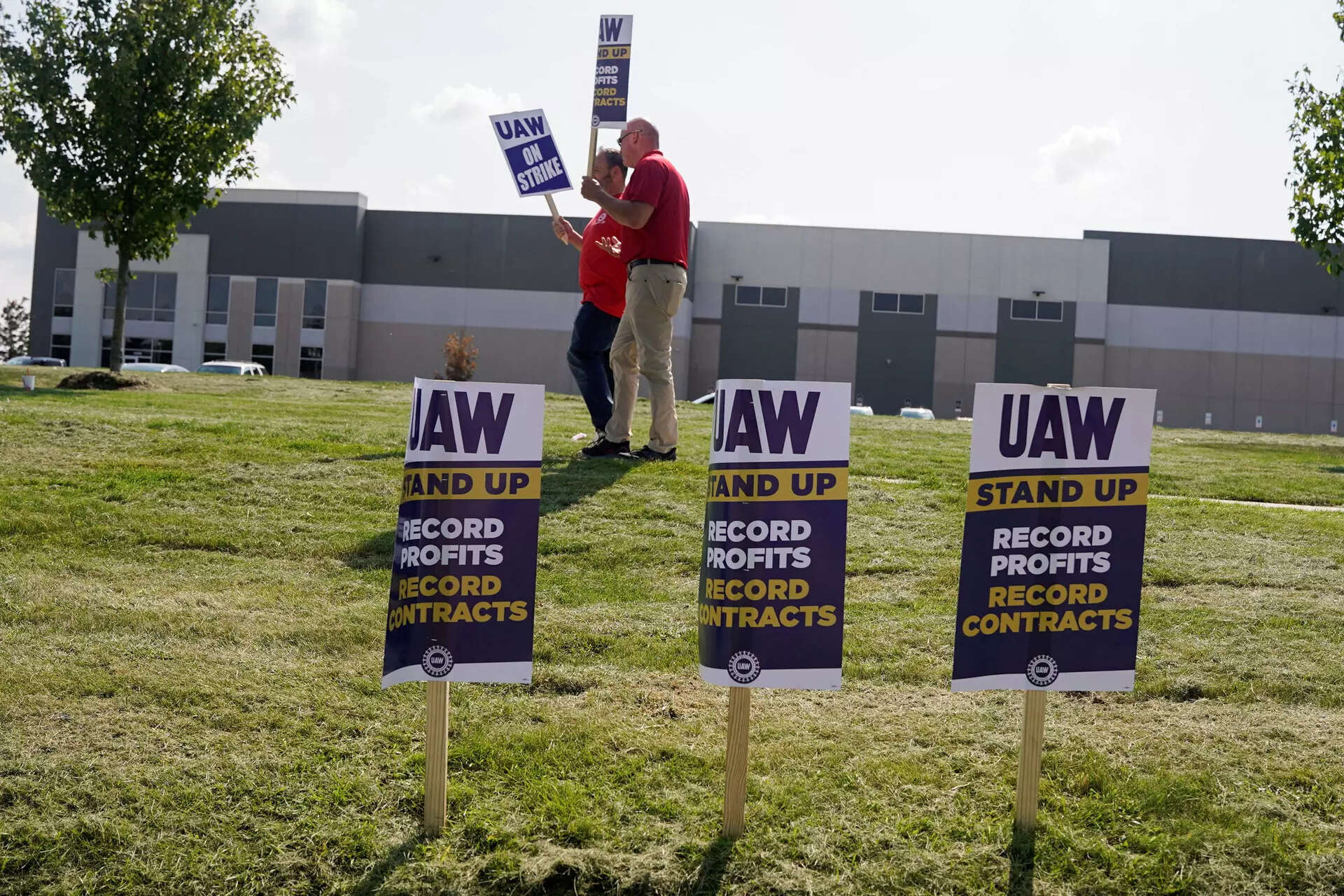
Electric vehicles are a “hoax,” they do not work, and they are strengthening China’s economy at the expense of American jobs.
Those are among the criticisms that contenders for the 2024 Republican presidential nomination, including former President Donald Trump and Florida Governor Ron DeSantis, have leveled on the campaign trail in recent weeks.
But while EVs have emerged as a common foe for Republicans seeking the country’s top job, they are increasingly a source of tax revenue and employment in the states that will determine the winner of the 2024 presidential election.
That has created a potential opportunity that President Joe Biden and some Democratic congressional candidates are seeking to exploit to win support before next November’s vote, according to 25 Democratic and Republican strategists, local officials, labor leaders and a review of campaign literature.
There have been roughly USD 128 billion in investments in domestic EV and battery manufacturing announced since the 2022 passage of the Inflation Reduction Act, or IRA. That law, supported by Biden and congressional Democrats, created tax credits to boost domestic EV manufacturing.
Of that investment, USD 48 billion – or one third – has taken place in Georgia, Arizona, Nevada and Michigan, according to an analysis done by advocacy group Climate Power at Reuters’ request. Those four states, along with Wisconsin, Pennsylvania and North Carolina, are the arguably the most competitive in the country.
In those seven states combined, Trump holds a 41% to 35% lead over Biden, meaning the race is extremely tight when the credibility interval is considered, according to a September Reuters/Ipsos poll. About 24% of respondents said they were not sure how they would vote or planned to vote for someone else.
Other surveys have indicated a dead heat in some of those states, meaning both Democrats and Republicans will be attuned to any angle that could give them even a slight advantage.
Mike Morey, a partner at public affairs and political consulting firm SKDK, said EV investments promoted by the Biden administration could make a significant difference.
“It’s pretty hard to ignore. We’re talking about billions of dollars (in investments),” he said.
The key for Democrats, he said, will be focusing on how Democratic legislation has created jobs, not on EVs themselves.
“You just need to sell jobs to independents and the rest of the country,” he said. “The point is that they’re manufacturing jobs, whether they be baskets or batteries.”
Trump leads the race for the Republican 2024 nomination by a wide margin. Biden has touted the IRA in recent television ads and has visited a pair of manufacturing facilities since August that build EVs and charging stations.
Clean Energy for America, an advocacy group close to Democrats, is running ads in Michigan, Georgia and North Carolina featuring workers talking about the benefits of the IRA, said its executive director, Andrew Reagan.
Kirsten Engel, a Democratic candidate in a sun-baked southern Arizona district laced with EV facilities, said she planned to frequently discuss how Democratic legislation has attracted EV jobs to the region, and that it had already come up in initial conversations with voters.
“It’s a top issue in the campaign,” she said.
“BIG BLUE PLASMA BEAM”
Since 2015, EV and battery supply chain investments in America have topped USD 165 billion, most of it occurring in the first year of the IRA, according to the Environmental Defense Fund and consulting firm WSP.
The IRA affords a tax credit to purchasers of EVs assembled in North America, while also incentivizing clean energy projects, like solar and wind farms – part of the Biden administration’s broader strategy to fight climate change.
Cheap land, low power prices, local tax incentives and solid infrastructure lured many of these projects to states that, out of happenstance, are political battlegrounds.
More recently, high interest rates have dampened demand for EVs, prompting some manufacturers to scale back expansion plans. But domestic EV sales remain relatively strong, topping 300,000 units for the first time in the third quarter. EVs are expected to make up nearly 50% of car sales in America by 2030, according to an analysis by the non-profit RMI.
In some communities where EV manufacturing has made an impact, it can be difficult to find a Republican who speaks ill of the industry’s local growth, even if they are wary of the underlying technology.
“I don’t know if I’ll go around on a lithium battery, so if I’m in a wreck I burn in a big blue plasma beam,” said Jesse Williams, the head of the Republican Party in Decatur County, Georgia.
Still, he supports an USD 800 million EV battery plant under construction in his community – and has no problem with tax credits that help bring the plant to what he describes as a “low-income” area.
On the presidential campaign trail, Republicans have struck a different tone. They have made clear they see IRA subsidies as government overreach, while expressing concern that minerals vital for EV manufacturing, like graphite and manganese, often originate in China.
Trump and other Republicans, who tend to back traditional energy sources like oil and coal along with gasoline-powered cars and trucks, have also appealed to the anxieties of the United Auto Workers union.
Many UAW members are wary of EVs as they require less labor to assemble than combustion engine vehicles. While the UAW is strong in Michigan, the union is weaker in the South and Southwest.
“Joe Biden’s electric vehicle obsession helps China, hurts American consumers and families, and is a pathetic non-solution to skyrocketing gas prices under his watch,” said Anna Kelly, press secretary for the Republican National Committee.
A Trump spokesperson pointed Reuters to a recent policy announcement in which the former president said EV manufacturing would harm workers. “What’s happening to our auto workers is an absolute disgrace and an outrage beyond belief,” Trump said.
The DeSantis campaign did not respond to a request for comment, though he has been consistently critical of EVs.
“Why would you want to knowingly make this country more dependent on what goes on in China?” DeSantis said in July.
Biden’s campaign pointed Reuters to a statement from Kevin Munoz, a campaign spokesman, who said Trump’s plan would mean more Chinese EV manufacturing jobs and fewer American jobs.
“Simply put: Trump had the United States losing the EV race to China and if he had his way, the jobs of the future would be going to China,” Munoz said.
Some elected Republicans at the state level are approaching EVs with decidedly more nuance, which can complicate Democrats’ messaging efforts.
Brian Kemp, the Republican governor of Georgia and a Trump adversary, opposes the IRA. But he has touted state-level tax credits that have brought EV manufacturers in-state, and has said he wants Georgia to be the “electric mobility capital” of America.
That means Democrats will need to work hard to illustrate the role their legislation played in EV development in the state, said Wendy Davis, a Democrat from Rome, Georgia, who has held multiple local positions.
Engel, the Democratic congressional candidate in Arizona, is facing off against Republican Representative Juan Ciscomani in 2024. Ciscomani has been the target of attack ads in recent months related to his opposition to the IRA, paid for by Climate Power and the League of Conservation Voters.
Still, Ciscomani, who did not respond to comment requests, has generally welcomed individual EV projects, and toured a local EV plant in August.
“We will be talking about my opponent’s votes against these investments,” Engel said.

